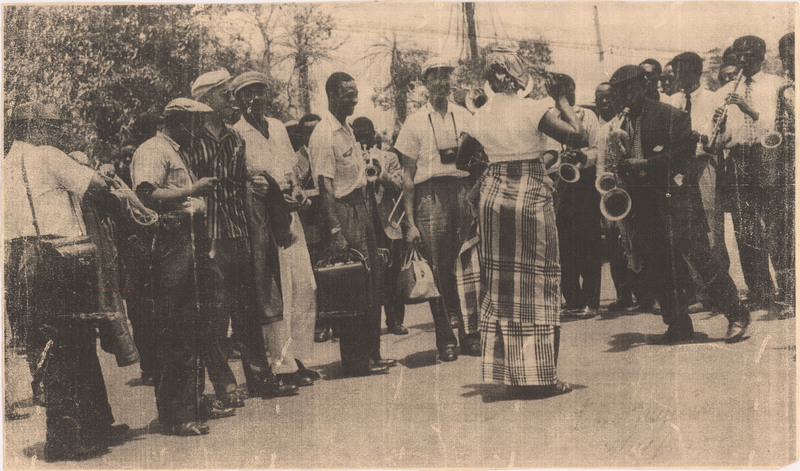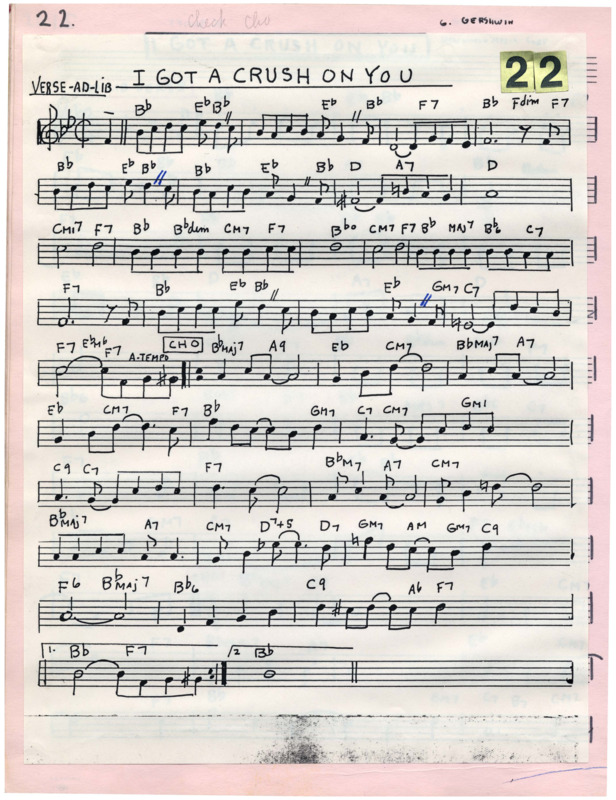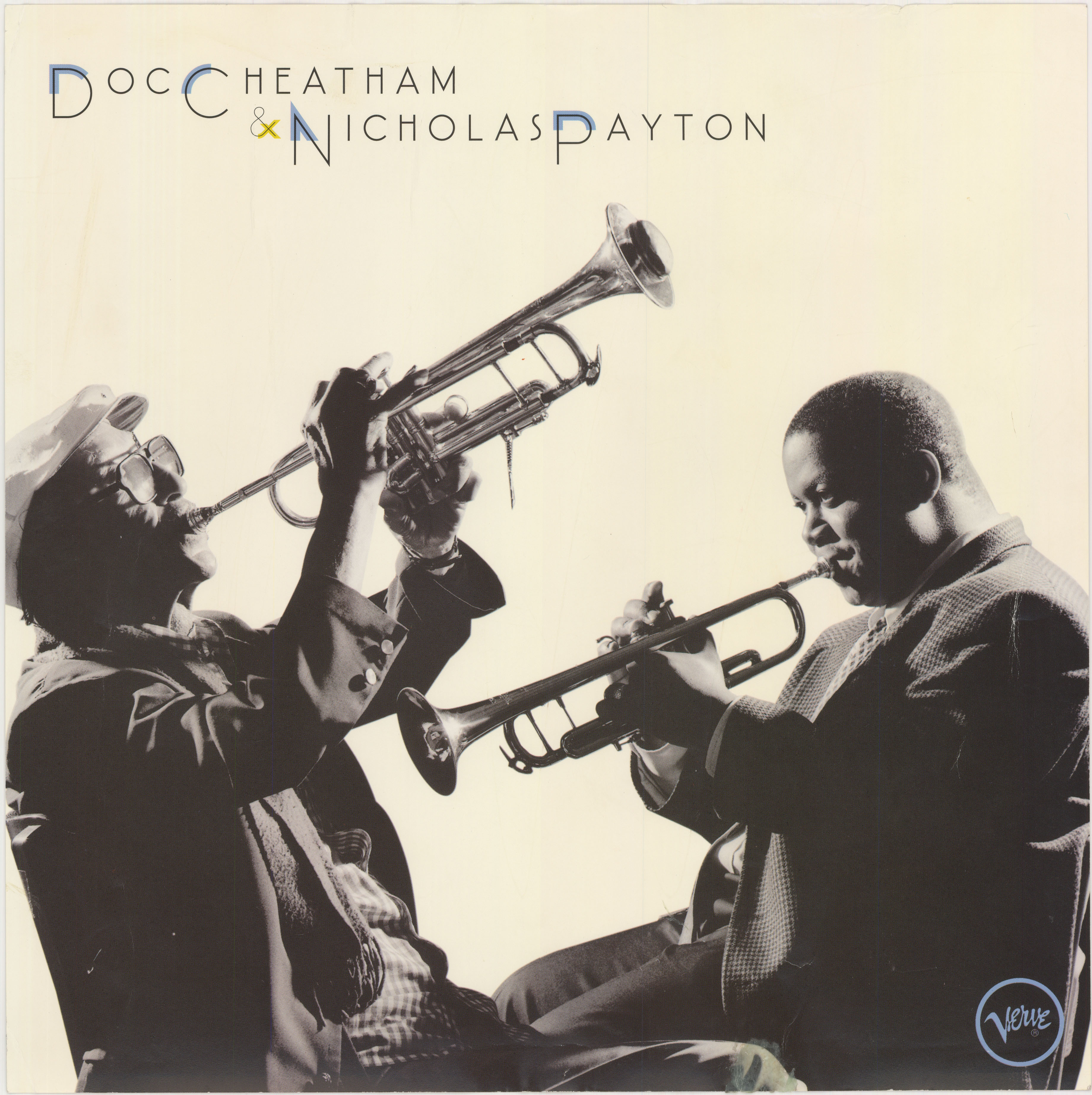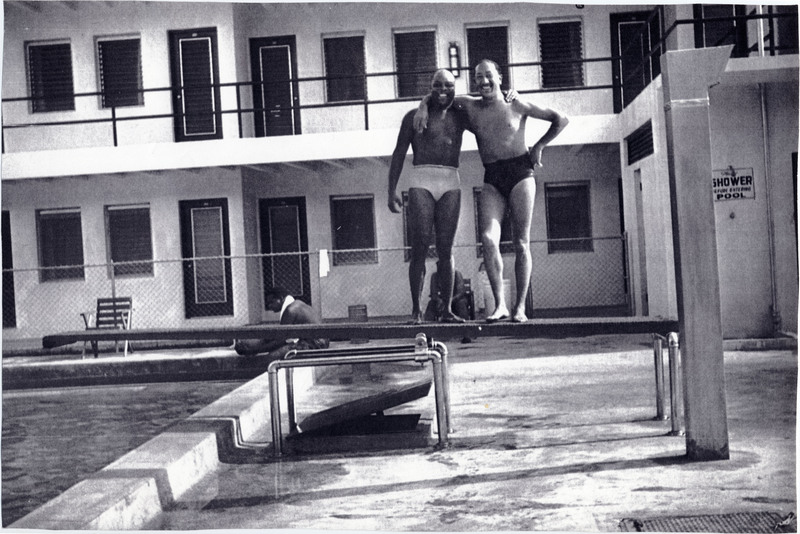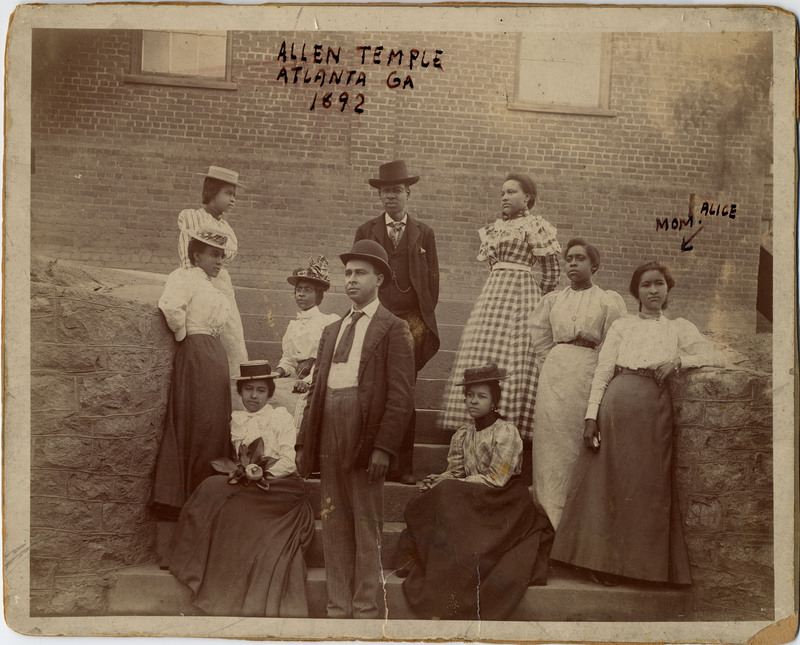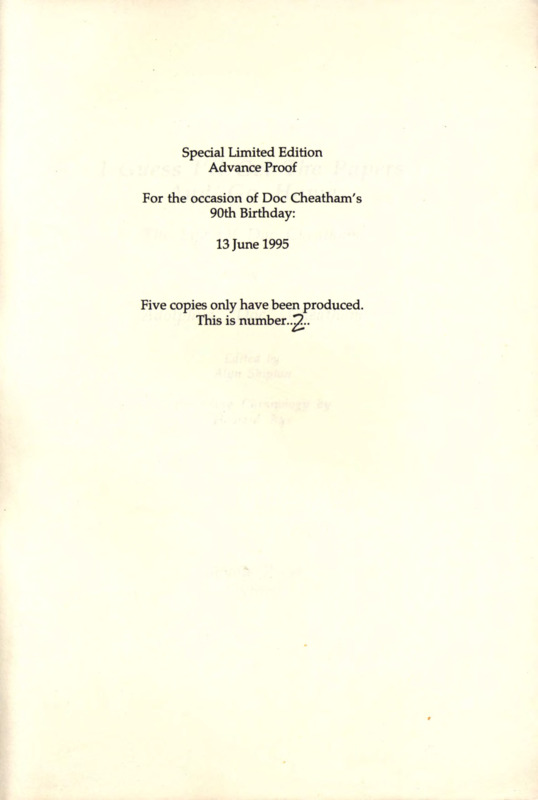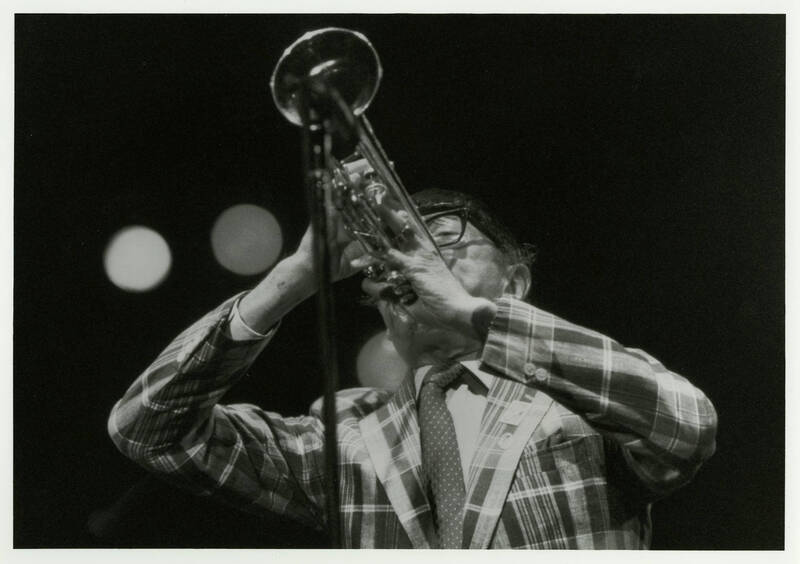Doc Cheatham Collection
Music, memories, and photographs of jazz trumpeter Doc Cheatham
Contents: About the Collection | About Doc Cheatham | First Career | Second Career | Influence | So What? | Collection Highlights | Collection Curator | Tech
About the Collection
This digital collection was created using materials from the Lionel Hampton Jazz Festival Collection and the Doc Cheatham Collection, sourced from the University of Idaho Library’s International Jazz Collections. The Cheatham collection consists of photographs, manuscripts, reel-to-reel records, clothing, and more donated by Cheatham’s widow, Amanda “Nellie” Cheatham.
About Doc Cheatham
Essay by Berry International Jazz Collection Fellow Esther David
Adolphus “Doc” Cheatham, Afro-Indigenous musician, continues to be celebrated for his warmth and vitality. Cheatham was born in Tennessee in 1905, and saw the big band, bebop, and jazz fusion eras. He rubbed shoulders with all the jazz greats of the 20th century as a lead trumpeter, ensemble member, and bandleader. Cheatham performed all around the world, gracing venues such as the Dreamland Cafe, the Cotton Club, and was a hallmark of the Sweet Basil Jazz Club in New York City’s Greenwich Village.
First Career
Doc Cheatham was born June 13, 1905 in Nashville, Tennessee. A member of a colored bourgeois family, he was Choctaw, Cherokee, and African. Although three-fourths Indigenous, he was classified “black.” At 14, Cheatham took up cornet through the Bright Future Stars Club before learning saxophone by ear. He earned the “Doc” moniker due to his medically-inclined family, who assumed he would follow suit. Cheatham’s first major gig was with Marion Hardy’s band, but he made his trumpet debut on the jazz scene in Chicago, when Lil Hardin connected him to sub for Louis Armstrong in 1926. The next few decades, he served as lead trumpeter for big bands with the likes of Sam Wooding, Benny Carter, Cab Calloway, Albert Wynn, and Chick Webb.
Touring was fun but grueling, conjoined with poorly-maintained black spaces, racist encounters, and sickness. Cheatham’s short-lived first and second marriages suffered from this strain. When the big band era declined after World War II, Cheatham took up Latin music among Perez Prado, Marcelino Guerra, and Ricardo Ray. On tour in Argentina, Cheatham met his third wife, who, despite not knowing English, traveled to New York with him.
Second Career
In the 60s, Cheatham’s second career launched as a trumpet soloist and vocalist. George Wein and Wilbur de Paris were paramount to this resurrection. In his 70s, Cheatham concentrated on growing musically, recording himself, consulting others, strengthening vocal technique, and fine-tuning his playing. His lively confidence and powerful melodic solos are exemplified on The Fabulous Doc Cheatham (1983), Doc Cheatham & Sammy Price in New Orleans (1988), and The Eighty-Seven Years of Doc Cheatham (1993). A septuagenarian and octogenarian, Cheatham traveled, performed, and recorded with astounding vitality. While not touring, Cheatham’s quartet entertained jazz brunches at Sweet Basil for the last 17 years of his life.
Influence
Cheatham mentored young musicians and learned from them as jazz evolved. He largely influenced free jazz pioneer Ornette Coleman. Cheatham’s second marriage was to Coleman’s aunt, a Cotton Club showgirl, in the 1940s. A teenage Coleman visited the pair in New York, where Cheatham introduced him to jazz and saxophone. Until his passing in 2015, Coleman was a jazz pioneer, breaking and redefining expectations.
Trumpeter Nicholas Payton’s career launched due to Cheatham. The two struck up a friendship on a jazz cruise. In 1997, the 91-year-old legend and 23-year-old prodigy released Doc Cheatham & Nicholas Payton. While on tour, Cheatham passed away in Washington DC, a fortnight shy of his 93rd birthday. In 1998, Cheatham received a posthumous Grammy for his “Stardust” solo on the record. Payton continues to cite Cheatham as a stylistic inspiration.
Cheatham lives on in adventurous trumpeter Theo Croker. As Cheatham’s grandson, Croker continues his legacy as an Afro-Indigenous musician. The Florida native also garnered a Grammy nomination. His grandfather’s complex solos and callbacks to classic jazz echoes through Croker’s music, a fusion of hip hop, jazz, electronic, and R&B.
So What?
Cheatham beheld the origins of jazz and its various 20th-century transformations. His career and resurgence of fame showcase his success from immersing himself in a variety of genres, global collaborations, and a constant drive for improvement. Mentored and influenced by jazz greats, Cheatham in turn mentored Ornette Coleman, Nicholas Payton, and Theo Croker, who rejected the label of jazz in favor of blending genres. Doc Cheatham’s long journey as an Afro-Indigenous trumpeter, eyewitness to history, and jazz trailblazer proves that old cats can learn new tricks.
Collection Highlights
Collection Curator
This collection and accompanying essay was produced by Esther David, 2022 Berry International Jazz Collection Fellow. Esther is a University of Idaho senior majoring in Secondary Education & English, and minoring in Music. The child of East Asian immigrants, Esther was born and raised in Boise, Idaho, and moved to Moscow for college. Among other creative pursuits, Esther played piano for the U of I’s Women’s Big Band, had artwork and writing published in the literary journal Thistle, played percussion and clarinet for the Vandal Marching Band, played synthesizer for U of I’s 2022 “Cabaret,” and co-wrote the U of I Writing Center’s antiracism statement, where they tutor at.
A student teacher at Moscow Middle School, Esther also drums for the Border Highlanders, sings in U of I Jazz Choirs I and II, teaches piano, writes creatively, and crochets. After graduating, Esther will spend a gap year in Malaysia with family, then return to the US for graduate school. This fellowship and collaboration with CDIL and Special Collections sparked an interest in research and digital preservation. Esther will continue to pursue teaching, research, writing, and of course, music, as they are passionate about the arts and making knowledge accessible to everyone.
Technical Credits - CollectionBuilder
This digital collection is built with CollectionBuilder, an open source framework for creating digital collection and exhibit websites that is developed by faculty librarians at the University of Idaho Library following the Lib-Static methodology.
Using the CollectionBuilder-CSV template and the static website generator Jekyll, this project creates an engaging interface to explore driven by metadata.

![click to see item Doc Cheatham smiles while sitting on a wooden stool. He is angled toward the camera. Cheatham has dark curly hair, and wears a dress shirt, plaid blazer with pocket square, striped bowtie, slacks, socks, and dress shoes. His left hand, holding his trumpet, is crossed over his left hand, on which his wedding ring is visible. A Louis Armstrong pendant hangs from the trumpet. Photographer Scott Sternbach wrote "I knew him pretty well as I was moonlighting as a bartender at Sweet Basil Jazz Club...It was a 4th flr walkup but that did not deter Doc on his 80th Birthday. I had invited him up to the studio one Sunday to create an image for a commemorative poster. If I recall we had a birthday cake and a small celebration in my studio. I really love that image and in particular the way the Louis Armstrong pendant [sic] hangs in just the right place off of the horn."](https://objects.lib.uidaho.edu/cheatham/small/ijcmg008_b001-poster003_sm.jpg)
